Why R. Crumb Will Never Draw for the 'New Yorker' Again
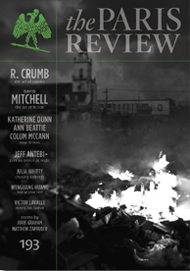
For every freelancer who’s ever had a story or a photo or an illustration killed by a capricious-seeming magazine editor, take heart! It happens even to the most famous of us. In the new issue of The Paris Review-edited by TPR managing editor and Awl pal Caitlin Roper!-R. Crumb explains why he’ll never draw for David Remnick’s New Yorker again.
I was asked by one of the art editors, Françoise Mouly, Art Spiegelman’s wife, to submit both covers and comic strips to them. I don’t remember how it came about that all the strips ended up being collaborations with Aline. I guess maybe, probably, it was that I didn’t feel comfortable doing solo strips for The New Yorker because of all the obvious restrictions and limitations — no explicit sex, etcetera — but, hell, the pay was good, and it’s easy to do those strips with Aline without feeling too terribly confined. But I began to feel compromised after an editor there rejected a cover I did for them and would give me no explanation, and so I’m through working for The New Yorker. I refuse to work for anyone under those circumstances, no matter how much they pay. I saw what that did to Harvey Kurtzman’s confidence as an artist, and resolved when I was still in my twenties to never let myself get into a trap like that.
I kind of love that.
There is lots of other great stuff in the issue! Including short stories by Colum McCann, Ann Beattie and Geek Love author Katherine Dunn, poems by Jorie Graham and Cynthia Zarin, and amazing photos of Haiti by Jeff Antebi. You may purchase it at your finer local booksellers or on the magazine’s website.
New Gaza Flotilla Footage Being Released Today
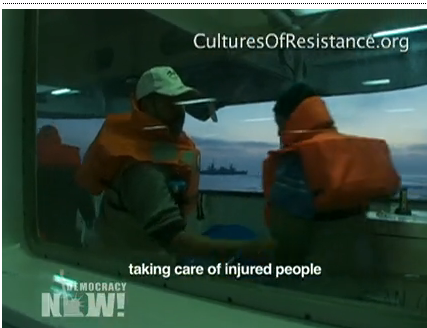
A tiny bit of the footage smuggled out of the Gaza flotilla-pretty much everyone on board (who wasn’t shot!) was recording, but the equipment and tapes were seized by the Israelis-is being presented today in a press conference at the UN. There’s bits of it showing today on Democracy Now: if you fast-forward to 39:12 in, you can hear the woman on board clearly announcing to the boarding party that people have been injured, that everyone on board is a civilian, that “all the passengers are sitting down,” and that the people boarding should not “use violence against the civilians.”
Not All Gays Are Drunk the Entire Summer Long

You may hear a rumor today that not all of the gays are drunk all summer. Most are! Sure, the vast majority are coked out of their minds! Certainly, don’t trust them with any sensitive work tasks on Mondays from now until Labor Day. (Especially the gay surgeons! Oh and the book editors, obviously, who are all smoking crack and hooking up with cab drivers and, oh right, screwing over their friends and semi-apologizing via memoir at a later date.) But some of the gays apparently don’t actually have an IV of alcohol hooked up to their shaved, gleaming forearms, even on the Island of Gay Sexy Time Pleasure. Here’s to biodiversity!
No Fantasy Sports for Old Men
“At 51, I have decided fantasy should be limited to sex, not football.”
David Remnick comes out against fantasy sports. Word!
Why Does Barack Obama Hate Britain?
Why Does Barack Obama Hate Britain?
“The whole might of American wealth and technology is displayed as utterly unable to deal with the disastrous spill-so what more natural than a crude, bigoted, xenophobic display of partisan political presidential petulance against a multinational company?”
–Norman Tebbit, a former member of Britain’s cabinet and a man who knows a thing or two about xenophobia, is just one of many angry British conservatives who think Barack Obama is fanning the flames against Knifecrime Island by referring the environmental saboteurs in Louisiana as “British Petroleum” rather than BP. “I do think there’s something slightly worrying about the anti-British rhetoric that seems to be permeating from America,” says buffoonish toff Boris Johnson, mayor of London. Also worrying: the flood of oil that seems to be permeating from the Gulf onto the coast.
OMG Carly Fiorina DID NOT Go There
California Republican Carly Fiorina, fresh off her victory in the Senate primary, was caught on an open mic dissing opponent Barbara Boxer’s ‘do. If this really is going to be the “year of the Republican woman” I am genuinely excited: I can’t wait until they start in on each other’s shoes and nails. If you thought it was bad when men were going after each other on the issue of weight, imagine what these malicious bitches are going to do to each other. Time to sit back and watch the catfight, am I right, fellas?
'New York Times' Bans the Word 'Tweet'

Phil Corbett, the latest standards editor at the Times (maybe the greatest job in the world?), has issued a proclamation! Yesterday, the following memo went out, asking writers to abstain from the invented past-tense and other weird iterations of the magical noun-verb “Twitter.” His case isn’t terrible, actually-and he offers this terrifying vision: “Someday, ‘tweet’ may be as common as ‘e-mail.’” Oh dear. Well, read for yourself and decide.
How About “Chirp”?
Some social-media fans may disagree, but outside of ornithological contexts, “tweet” has not yet achieved the status of standard English. And standard English is what we should use in news articles.
Except for special effect, we try to avoid colloquialisms, neologisms and jargon. And “tweet” — as a noun or a verb, referring to messages on Twitter — is all three. Yet it has appeared 18 times in articles in the past month, in a range of sections.
Of course, new technology terms sprout and spread faster than ever. And we don’t want to seem paleolithic. But we favor established usage and ordinary words over the latest jargon or buzzwords.
One test is to ask yourself whether people outside of a target group regularly employ the terms in question. Many people use Twitter, but many don’t; my guess is that few in the latter group routinely refer to “tweets” or “tweeting.” Someday, “tweet” may be as common as “e-mail.” Or another service may elbow Twitter aside next year, and “tweet” may fade into oblivion. (Of course, it doesn’t help that the word itself seems so inherently silly.)
“Tweet” may be acceptable occasionally for special effect. But let’s look for deft, English alternatives: use Twitter, post to or on Twitter, write on Twitter, a Twitter message, a Twitter update. Or, once you’ve established that Twitter is the medium, simply use “say” or “write.”
Make of it what you will. But, my quibble? I cannot believe he takes that horrible turn in the last sentence! No one “says” anything on Twitter! That’s pollution of the language. One either WRITES or one SAYS. I will never accept the argument that these words are interchangeable!
Related: other words that begin with “t” that the Times won’t print include “tuchus.”
Now This Is Happening
Ahem: “In the study of more than 1,000 unmarried young adults between the ages of 18 and 23, Wake Forest Professor of Sociology Robin Simon challenges the long-held assumption that women are more vulnerable to the emotional rollercoaster of relationships. Even though men sometimes try to present a tough face, unhappy romances take a greater emotional toll on men than women, Simon says. They just express their distress differently than women.” Why yes, it does get annoying, being right all the time. Thank you for asking.
JTF-GTMO: Exclusionary Rules
by Graydon Gordian
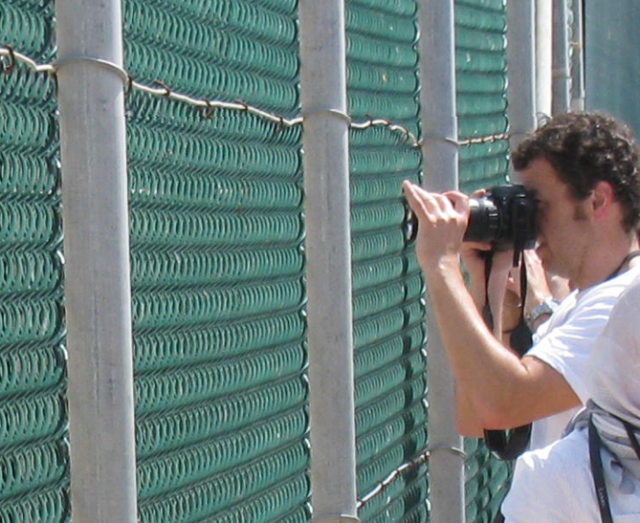
I was in line at the jerk chicken joint with a few reporters and the gaggle of human rights attorneys that had come down for the hearings. The night was hot but soft. There weren’t that many bugs considering the humidity. We were having a casual conversation, about what exactly I don’t remember, when one of the attorney’s eyes widened.
I turned to see her embrace a slender Asian woman, early 30-something, who was accompanied by a pair of lanky, benign-looking fellows. The interaction seemed harmless enough but, secretly, it was terribly awkward. I should have expected as much. What kind of person do you happen to run into in Guantanamo Bay?
As it turns out, you run into someone that you had a falling out with because you suspected that, when she joined the FBI, she became a member of a “clean team.” Clean teams are the interrogation units that attempt to “legally” procure incriminating statements from suspected terrorists after they’ve been tortured.
In American jurisprudence, we have a concept referred to as “fruit of the poisonous tree.” Although the concept can apply to a variety of situations, in this instance it means that, once someone is tortured, any statements he or she provide exist in the shadows of that experience. Even if they repeat themselves in a non-coercive atmosphere, the torture has presumably so deeply affected their reliability that even those remarks can be rendered inadmissible in court.
This concept originated some centuries ago, grew as a force of law in American courts from the 1920s to the 1960s and now plagues intelligence gatherers such as, perhaps, the attorney’s once-close friend. It is also the crucible in which Omar Khadr’s freedom is held.
Khadr is the first person to be prosecuted under the military commissions since Obama took office. He was born in Canada. He was fifteen when captured on an Afghan battlefield, and he claims to have been tortured repeatedly during his eight years in U.S. custody. The case is a nightmare for the Obama administration. Why they are choosing to pursue Khadr’s conviction at all, much less first, is a question for which I have no answer.
I had begun covering national security only a few weeks earlier, when I moved from Chicago to D.C. to finish up my masters in journalism. One morning I was making a few routine calls, familiarizing myself with the PR folk at assorted federal departments and congressional committees, when a DoD operator connected me to Major Tanya Bradsher. She is a business-minded DoD press representative who, as I found out, handles travel arrangements for members of the media headed to Guantanamo.
When she first answered the phone, I thought I was looking for Maj. Taylor Bradsher and obnoxiously assumed I was speaking with his secretary. Despite having made a complete ass of myself, Tanya asked if I’d like to join her when she took a group of journalists down to Guantanamo to cover Khadr’s pretrial hearings at the end of the month.
“Excuse me?”
After we hung up, I immediately emailed her to gauge just how empty of a gesture it was. Offering to fly a young reporter that she had never met down to Guantanamo seemed strange, or suspicious, but I sure wasn’t going to pass up the opportunity.
I asked my editor for some funding and my grandfather for a little advice. “Stay away from those Havana women or else you’ll have to play your prick like a pied piper to take a piss,” he said. I asked my professor, who’s been down there a few times, what to bring. He said to pack a swimsuit.
Armed with this counsel, I arrived at Andrews Air Force Base at 5 a.m. on Monday, April 26 with a stern look that probably didn’t suggest my gravity as a reporter. It more likely conveyed “I have no business being here.” But then again, I thought we were all serious journalists headed down there to take a hard look at the torture, indefinite detention and ramshackle commissions structure that has so acutely called into question the rule of law in the United States.
The first order of business: Carol Rosenberg, a reporter for The Miami Herald and the “dean” of the Guantanamo press corps, corralled us into one corner of the unexpectedly standard terminal (I had pictured an abandoned airplane hangar) where we all took part in a rousing rendition of “Happy Birthday” for the court sketch artist.
You may have heard Carol’s name recently. She, The Globe and Mail’s Paul Koring, the Toronto Star’s Michelle Shephard and Canwest News Service’s Steven Edwards would, on May 6, be banned from covering any future commission proceedings. Their offense? Publishing the real name of “Interrogator #1,” a court-order protected witness who had given an on the record interview to Shephad previously.
The rumor was that Tanya teared up a bit when she read them the letter from her superiors announcing the ban.
But that decision to ban the four reporters-who have probably spent more time in Guantanamo than the rest of the two dozen other reporters on the trip combined-was still weeks away. Their spirits were high.
* * *
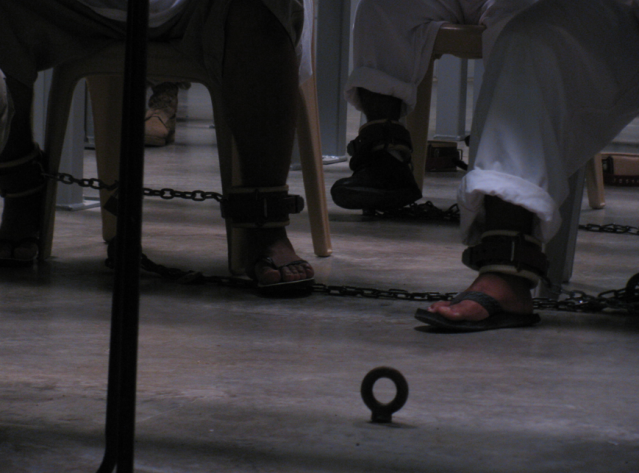
The plane was a commercial passenger jet, just like any other, except we could sit wherever we liked. I politely passed up the opportunity to join some of the senior reporters in the back for mimosas. Instead I chose to sit with two civilian attorneys as they discussed their frustrated attempts to challenge their clients’ detainment in federal court.
In Cuba, I settled into my lodging, a six-person tent kept freezing cold by a roaring air conditioner. Then I went to the sort of abandoned airplane hangar that I had envisioned earlier. It existed-it just wasn’t the terminal at Andrews. It was the media center in Guantanamo: huge, filthy doors and dust-covered concrete floors, and a view uphill towards the converted control tower that served as the courthouse.
That afternoon featured a bristly press conference with Navy Captain David Iglesias, a prosecutor and legal advisor for the Office of Military Commissions, known as the OMC. Iglesias gained some notoriety when he and other U.S. attorneys were forced out of Alberto Gonzalez’s Justice Department for being insufficiently loyal to the Republican Party. Few of the reporters knew in advance that Iglesias was going to be the OMC’s press representative when they arrived on the base, or that he was even working for the Department of Defense. These are the kind of people you just happen to run into in Guantanamo.
* * *
In 2002, American forces captured Omar Khadr after a firefight near Khost, Afghanistan. He was found under a pile of rubble. He had (and still does have) shrapnel in both eyes; his left eye is permanently blind. He had two exit wounds about the size of baseballs in his chest. He was so bled out that, when found, the gaping holes were no longer bleeding. His body was covered in dust, giving him the color of the ground beneath him.
Paul Koring, one of the soon-to-be-banned journalists, said, “I’ve seen dead guys who looked a lot more alive than Khadr did in that photo.”
Were I a soldier, I’m not sure I would have even checked on him. The fact that Khadr survived is a testament to the abilities of the battlefield medics who treated him. It could be that the medics’ salvation efforts stemmed from some inherent American magnanimity, but also Khadr was perceived to be an intelligence asset.
His father, an aid worker and radical Muslim named Ahmed Said Khadr, had what they call “close ties” to Osama bin Laden. During trips to Afghanistan with his father in the late ‘90s and early ‘00s, the younger Khadr is believed to have met not only bin Laden but such nefarious figures as Dr. Ayman Al Zawahiri, Muhammed Atef and Saif al Adel.
During the firefight, a grenade killed Sgt. Christopher Speer, a Delta Force commando. The government alleges Khadr threw the grenade and has charged him with murder, along with conspiracy, material support of terrorism and spying.
In addition to the fact that murder is not traditionally a war crime, there is something bizarre about the charges filed against Khadr. According to his attorneys, the official description of the battle originally said Speer’s killer died, obviously ruling out the still-alive Khadr. An updated version of the document says Speer’s killer was merely “engaged.” The origin of the grenade remains disputed.
Even if Khadr’s attorneys can cast doubt on the charge of murder, the other three allegations are slightly, well, less alleged. During the hearings I watched a video of Khadr, smiling and downy, and in it he was building IEDs and planting them along Afghan roads frequented by American forces.
The film is basically a terrorist home movie, shot in the same choppy manner in which Americans film baby’s first steps and little league games. It’s terribly lighthearted; at one point an unidentified man, fanning himself, jokes that the jihad against heat is far more trying than the jihad against the U.S.
As with all filmed activities, the video is supremely damning. But in another sense, no piece of evidence I have seen so strongly confirms that, at the time of his capture, Khadr was still a child. He is significantly younger than every other person in the video, and appears immensely impressionable. His companions are the radical Islamic version of the mischievous American uncles who nod and wink as your mother hurries to flip the TV away from an unexpected sex scene, who slip you a sip of their beer when she isn’t looking.
* * *
My intrigue was not enough to suppress the uneasiness I felt as I looked at them. A chain-link fence separated us. Nothing they were doing was terribly interesting. One was jogging. Another was doing pull ups. The centerpiece of what is one of the most fascinating legal disasters in the contemporary world, their lives are the dictionary definition of banal.
Journalists are not allowed to photograph their faces, making them difficult to identify. We were not allowed to talk to them, even if they spoke to use-and they did speak us. As the jogger circled past our end of the yard, he smiled. “Put me next to bin Laden,” he said. I guess he was making a joke. Either way, we all laughed.
As we were herded through the detainment facilities, the Lt. Colonel leading our tour made sure to impress upon us the quality of the conditions in which the detainees live, or, now live. Even the most high-value detainees have a few hours of recreation each day. The low-value, “compliant” detainees I saw in Camps Four and Six get significantly more.
They are given a choice between the two camps and can request to be moved. Some prefer the more spacious design of Camp Four, while others are fond of the modern amenities, such as satellite television, available in Camp Six. They are offered classes: Arabic-to-English, Urdu-to-English, Pashto-to-English, “life skills” and also resume building. According to the Lt. Col., only one detainee has taken advantage of the resume building course. I do not know whether or not he has found gainful employment.
Several people on the tour thought the detainees looked resigned, relaxed even. I thought “pacified” was more appropriate. The Department of Justice has no plans to prosecute a significant number of them, while even more have been cleared for release and then, for all intents and purposes, forgotten. Despite the cosmetic improvements the Obama administration has made to the facility, its purpose remains the same: To keep these men beyond the reach of the law.
The base may be more transparent than under the Bush Administration. The detainment conditions may be more humane than under the Bush Administration. The commissions, although still deeply flawed, finally have a set of rules. And there are still plans to move the whole facility, commissions and all, to a new location in Thomson, Illinois, although the Obama administration’s failure to secure congressional funding threatens the move.
The space, however, remains infected by the events that took place there, and the stench of that infection will linger no matter where the commissions are held or the detainees are housed. The entire tree seems poisoned.
* * *
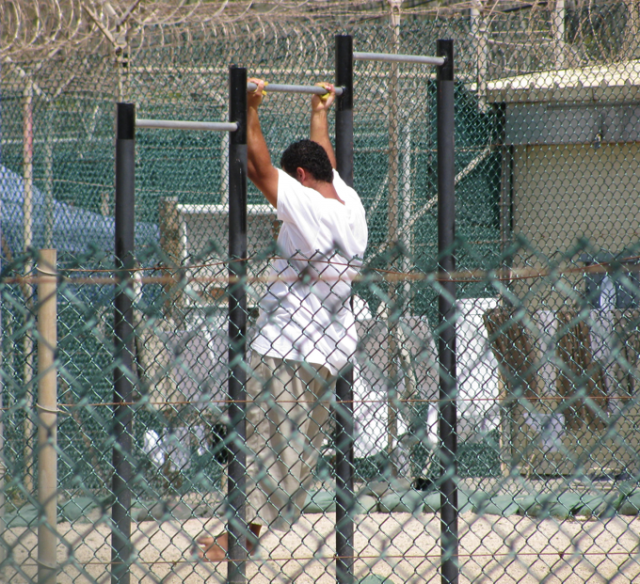
After being airlifted from the site of the battle, Khadr spent the first week of his detainment unconscious in a hospital bed in Bagram Air Base. When he awoke, Khadr’s interrogation and torture began immediately. Khadr said that, while detained at Bagram and then Guantanamo, he was subjected to a variety of abuse. He was interrogated while an air-restricting bag covered his head and dogs barked in his face. He was forced to stand for hours at a time with his hands strapped to the ceiling, causing severe pain in his bullet-riddled shoulders and chest. He was not allowed to use the bathroom during interrogations and forced to urinate on himself. He was repeatedly threatened with rape or to be sent to countries like Israel, Syria, Jordan or Egypt where he would be subjected to more merciless forms of torture.
This all occurred during the roughly 90 days he spent at Bagram. He had yet to set foot on the island of Cuba.
Upon his arrival in Guantanamo, he was greeted with the words, “Welcome to Israel.”
While waiting to be processed, Khadr was forced up against a wall by a soldier’s elbow. He eventually passed out from a lack of oxygen, was revived, and then forced up against the wall until he passed out again. This was repeated several times. It was around the time that an interrogator told him “get ready for a miserable life” that Khadr said he succumbed to bouts of depression. During interrogations, he would break down crying; his hands and feet would be cuffed in painful positions for hours at a time. Again he was forced to urinate on himself, but this time his interrogators used him as a human mop to clean up his own piss. He was spat on, his hair was torn, and his room was kept extremely cold. And again, like in Bagram, Khadr was threatened to be sent to Jordan, Syria, or Egypt, where his interrogators said he would be raped.
When I sat some 30 feet from Khadr on the opening day of the hearings, he looked to me to be just as much a boy as he was on the day he was captured. Not physically, of course. Then he was 15; now he is 23-years-old. In fact, going on looks alone, you’d be unlikely to recognize him. When captured, his face was hairless and acne-ridden; now he sports a full beard.
It was the sharpness of his smile that gave him away; just another scared and confused kid playing the tough guy.
He wasn’t the only one who was confused. Late the previous evening, Secretary of Defense Robert Gates signed the Manual for Military Commissions. The judge delayed the hearings until the early afternoon, in order to give both prosecuting and defense attorneys an opportunity to study the several hundred-page manual. Neither side seemed to have a firm handle on the proceedings.
* * *
There is an old Looney Tunes cartoon featuring a wolf and sheepdog, named Ralph and Sam respectively. They have the arms-length affection that develops after years of mutually endured manual labor. Every morning they physically insert a time card in and out of a clock, an antiquated act few people I know have first-hand experience with. Once on the job, Ralph immediately begins evading Sam, who protects his flock with the hard-boiled calm of a cop who’s seen it all. For the time being, they are antagonists. Vaudevillian comedy ensues and, if I remember correctly, Sam always wins the day.
Later that night, most of the members of the media loaded in a van and headed for O’Kelly’s.
Designed like every other pre-manufactured Irish bar you’ve ever been in-cheap dark wood paneling, throwback Guinness advertisements-O’Kelly’s takes the forced collegiality of Guantanamo and compresses it even further. The room is filled with people who just hours ago were at each others’ throats: Reporters, JAG officers, human rights observers, civilian defense attorneys. The only ones who couldn’t make it out for a drink are the detainees.
Discussing the day’s events isn’t prohibited. A seat at the bar is the ideal spot to have a frank, off-the-record conversation with OMC personnel. But the tone is, if not friendly, at least passive. During the day, everyone is ready to scrap. At night, people are either too tired or too human to pick a fight.
After spending a long day watching FBI agent Robert Fuller discuss the downright hospitable conditions under which he claims to have interrogated Khadr (“I made sure he never had too much light in his eyes”), I was more in the mood to quietly drink my Defense Department subsidized beer and watch hockey than talk shop.
* * *
In D.C. a few weeks later, I ran into Paul Koring at the National Press Club. He had bought me a drink at O’Kelly’s after the 8th seed Montreal Canadiens completed an improbable comeback and defeated the Washington Capitols in game seven of the first round of the NHL playoffs. I told him, if the San Antonio Spurs won their opening round series against the Dallas Mavericks, I’d repay him the favor. The Spurs won in six and I owed him a drink.
We talked about the hearings, which were suspended for several weeks to give the prosecution’s psychologists an opportunity to diagnose Khadr. We also talked about the Defense Department’s decision to ban him from covering the commissions. I won’t jeopardize his pending appeal by divulging any specifics. I will, however, reveal one thing he said that really meant something to me.
Paul said that young journalists were important because we reminded guys like him just how strange a place Guantanamo is. He said it is easy to let the place grow too familiar, and the edginess and discomfort that first timers feel helps him keep perspective. Not all the journalists felt that way. Some have complained that younger reporters who go down there are easily manipulable. They think that a first-timer’s unfamiliarity with the base is intended to be a vehicle for the OMC’s narrative. There’s some truth to that, but I appreciated Paul’s take. His humility is attractive for one thing. And, in all honesty, it’s flattering, and everyone, really, is susceptible to flattery.
Graydon Gordian has been known to dominate. He needs to update this, and lives the sporting life here.
'The View' Inspires Golden Girls Crack WAY TOO SOON
RT @theviewtv We have a ‘Golden Girl’ coming to visit us on Monday! http://ow.ly/1Wnn0 ••• Gee, I wonder which one?Wed Jun 09 19:58:54 via web
Nancy Franklin
nancyfranklin
